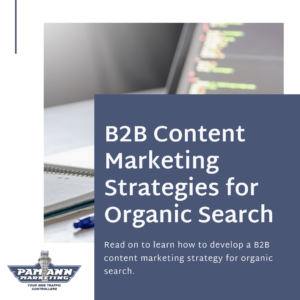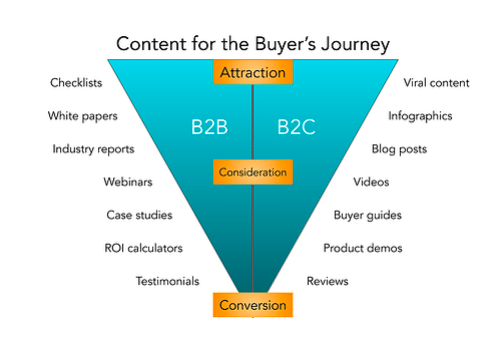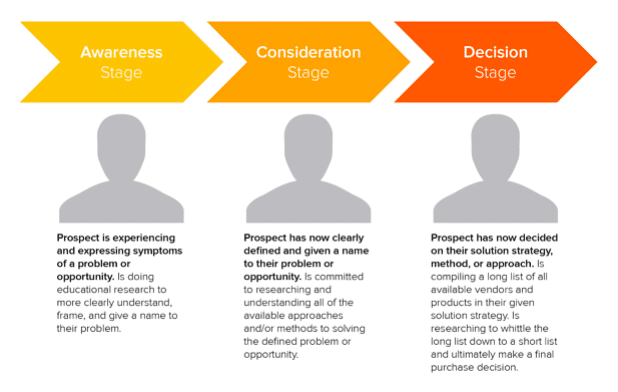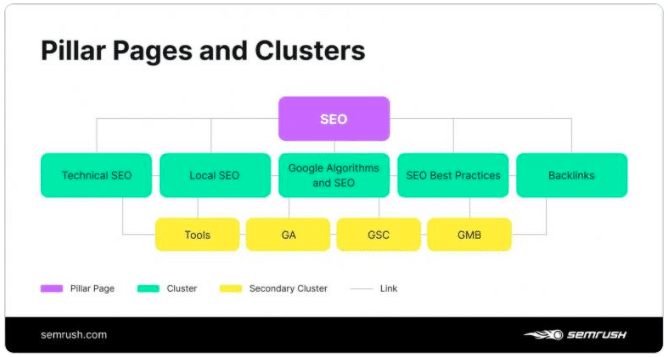 Oftentimes, business-to-business (B2B) content marketing can get a bad rap for being boring and dull in comparison to B2C marketing, but as SEMrush states, “content marketing [for B2B companies] provides the backbone of their customer acquisition strategy. When a solid strategy is in place, it can be a phenomenal growth engine.”
Oftentimes, business-to-business (B2B) content marketing can get a bad rap for being boring and dull in comparison to B2C marketing, but as SEMrush states, “content marketing [for B2B companies] provides the backbone of their customer acquisition strategy. When a solid strategy is in place, it can be a phenomenal growth engine.”
As someone who markets to a B2B audience for my own business, read on to see what I’ve learned when it comes to developing the right B2B content marketing strategy for your business and how you can utilize content marketing for organic search.
What is B2B Content Marketing?
B2B content marketing is, according to WordStream, “the art of using content to expand your business’s audience, strengthen and develop brand affinity, and ultimately drive leads and sales by appealing to other businesses.” Unlike your run-of-the-mill consumer-facing content marketing, B2B content marketing is used exclusively by businesses, for businesses. And while there are definite similarities between B2B and B2C content marketing, it’s important to be mindful of the difference.
The Difference Between B2B and B2C Content Marketing for Organic Search
According to the Content Marketing Institute, “content marketing is a strategic marketing approach focused on creating and distributing valuable, relevant, and consistent content to attract and retain a clearly-defined audience — and, ultimately, to drive profitable customer action. These principles remain the same whether you’re using a B2B content marketing tactic for your B2B or B2C (business to consumer) company.”
The foundation of most B2C content marketing strategies is identifying your customers’ pain points and showcasing how the company’s products and services can alleviate those pain points through traditional marketing practices. B2B content marketing, on the other hand, should focus on showcasing the business’s expertise, driven by logic and a desire to educate their target customer. A B2B content marketing strategy should provide valuable information that informs the customer (in this case, usually another business), which is also the basis of any successful content marketing strategy for organic search.
As shown in the picture below, the B2B content marketing plan relies on different types of content to guide buyers through the buyer’s journey when compared to the more commonly thought of content for a B2C buyer’s journey.

Because the B2B buyer journey is typically shorter than the B2C customer’s journey, the content you create for your B2B content strategy should vary much more than a B2C content strategy. However, while the content type should vary, the underlying message should always point back to you as an expert or thought leader in your field. B2B blog marketing is one of the most effective content strategies you can use to:
- Create a home base for the majority of your content that your target audience can return to again and again.
- Consistently develop new content as part of your content marketing for organic search to ensure search engines have new, quality content to evaluate so your website can rank higher on search engine result pages (SERPs).
How to Create the Right B2B Content Marketing Strategy for Organic Search
As SEMrush states, “a successful B2B SEO strategy places a business’s website in front of people who are actively looking to engage the services they offer or buy the products they sell.”
No matter where your target audience is in the buyer’s journey, your B2B content marketing strategy should always lead potential customers back to your website. And while it might be tempting to flood your owned content channels with sales-driven messages that will hopefully lead customers back to your website, the most effective B2B content marketing best practices preach the oppposite: develop content that will resonate with your target audience.
To do so, you’ll first need to understand your current sales funnel and develop a couple of buyer personas.

Understand Your Sales Funnel
Before you start implementing a new B2B content marketing plan, you need to understand how your business’s sales funnel work, which includes:
- Identifying the most successful touchpoints along your ideal buyer’s journey
- Reviewing your sales and analytics data to pinpoint how customers are finding your business, including the:
- Average time to purchase
- Average customer retention period
- Reasons why customers leave
Create a Buyer Persona
Once you have a better understanding of your current sales funnel, you can begin to develop a new B2B content marketing plan based upon your business’s buyer personas.

A buyer persona is, as SEMrush describes, an “abstract depiction of your ideal customer, founded upon both qualitative and quantitative data from market/competitor research and existing customer profiles. It’s not about describing the business’s potential purchasing audience, but about generating a set of insights that can be used by marketing, sales, and product departments to make informed decisions and smarter investments.”
One of the best ways to go about developing your buyer personas, as mentioned above, is to understand your current sales funnel, which includes understanding where your website visitors are spending the most amount of time. As WordStream states, “you can learn a great deal about the people visiting your site. You can see basic demographic information, such as age, gender, and location, as well as valuable interest data that shows the topics they’re interested in. This is crucially important, as even if it’s not central to your business, it provides a way for you to ‘land and expand’ into new, tangentially relevant subject areas.”Creating a detailed buyer persona is one of the first steps you should take when you’re creating your business-to-business content marketing strategy. The more you know about your target customer and their needs, the better you’ll be able to tailor your B2B content strategy to resonate with them.
To ensure your B2B content marketing strategy will reach all of your potential customers, it’s typical for businesses to develop multiple buyer personas. The more you understand about as many of your customers as possible, the better.
Conduct Keyword Research Based on Your Buyer Personas
The foundation of B2B content marketing best practices is performing detailed keyword research. You can utilize your keyword research to not only target your buyer personas but also to ensure your website’s content is consistently ranking well on SERPs. The more your content directly correlates to what your buyer personas are searching for, the better your website will rank and the more likely your target audience will be to convert.
To get yourself started, here are a couple of questions to ask yourself when you’re thinking about each of your buyer personas:
- What are the pain points each of your buyer personas faces?
- How are they searching for possible solutions to these pain points?
- How do your products and services provide the solution to these pain points?
- What are the keywords, both informal and commercial terms, that are driving the most organic traffic to your competitors’ websites?
Once you’ve identified which keywords to incorporate into your B2B content strategy, you can use the broader terms to develop topic clusters. Topic clusters are the basis for a group of content that focuses on one topic and links back to a pillar page, or landing page, on your website. The below example that SEMrush created shows the pillar pages and content clusters for SEO-related content.

As SEMrush explains, “a topic cluster should start with a robust pillar page (the hub for a specific topic) and then include links to all-related topic cluster pages (a more in-depth page that answers a specific question about your broad topic and links back to the main pillar page).”
Using topic clusters is one of the best B2B content marketing strategies you can utilize to further optimize the landing pages for your products and services as well as to develop scalable content that you can consistently build upon over time. The best types of content to develop for B2B content marketing include:
- Videos
- Podcasts
- Case Studies
- White Papers and eBooks
- Newsletters
- Templates and Checklists
Keep in mind that you might find that some of these content types don’t resonate with your target audience. While it’s important to ensure you’re developing a variety of content, it’s even more important that your audience finds your content useful, no matter that type it is.
Need B2B Content Marketing Services?
If you’re looking for guidance when it comes to developing the best B2B content marketing strategy to enhance the organic search results for your business, we are happy to help. Our professional SEO services are “white hat” and completely in line with Google’s Webmaster Guidelines. To be successful at SEO, you need a plan. We’ll perform in-depth research to formulate a strategic plan to develop your business’s best B2B content marketing plan. Contact us to discuss your specific SEO needs.
*Photo Credits: SEMrush, WordStream, Liquid Agency
- Google is Helping U.S. Government Sites Advertise the Sale of Illegal Drugs - October 16, 2024
- Google Has Been Ruled a Monopoly in Antitrust Lawsuit (Video) - August 9, 2024
- New Domain or Subdomain? Which is Better for SEO? - October 13, 2023
